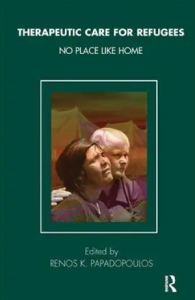Therapeutic Care for Refugees: No Place Like Home

Editor: Renos K. Papadopoulos
Publisher: Routledge
Year of Publication: 2002
Print Length: 348 pages
Genre: Non-Fiction / Psychology, Migration & Refugee Studies
Topic: Refugees & Forced Migration, Asylum & Asylum Seekers, Care, Medicine & Healthcare, Mental Health, Therapy, Wellbeing Psychosocial, Ethics & Morality, Politics & Power
This volume addresses the complexities involved in attending to the mental health of refugees. It covers theory and research as well as clinical and field applications, emphasising the psychotherapeutic perspective. It explores the delicate balance between accepting the resilience of refugees whilst not neglecting their psychological needs, within a framework that avoids pathologising their condition.
Moreover, it deals with the difficulties in delineating the various relevant intersecting perspectives to the refugee reality, e.g. psychological, socio-political, legal, organisational and ethical. The book introduces important considerations about the actual psychotherapy with refugees (in individual, family and group settings) but in addition, it encourages the introduction of therapeutic elements to all types of work with refugees. Thus, it argues for the necessity of approaching every facet of the refugee experience from a therapeutic perspective; this is why the title refers to therapeutic care rather than to psychotherapy.
Table of Contents
Series Editors’ Preface
Acknowledgements
Foreword
Editor’s Foreword
Contributors
Introduction — Renos K. Papadopoulos
DELINEATING THE CONTEXT
1. Refugees, home and trauma — Renos K. Papadopoulos
2. Misconceiving refugees? — Peter Loizos
3. The refugee condition: legal and therapeutic dimensions — Judith Farbey
CLINICAL
4. Remaking connections: refugees and the development of “emotional capital” in therapy groups — Caroline Garland, Francesca Hume and Sarah Majid
5. Refugee children and abuse — Judith A. Trowell
6. Finding a way through: from mindlessness to minding — Maureen Fox
7. Killing time: work with refugees — Valerie Sinason
8. Transient familiar others: Uninvited persons in psychotherapy with refugees — Renos K. Papadopoulos and Violeta Hulme
RESEARCH
9. “We have to blame ourselves”—refugees and the politics of systemic practice — Chris Glenn
10. Two phases of the refugee experience: interviews with refugees and support organizations — Pamela Griffiths
FIELD PROJECTS
11. Some assumptions on psychological trauma interventions in post-conflict communities — Natale Losi
12. Strangers to ourselves — Andrew Cooper and Sue Rendall
13. Working with psychosocial counsellors of refugees in their country of origin: exploring the interaction of professional and other discourses — M. Kemal Kusçu and Renos K. Papadopoulos
14. In the aftermath of violence: therapeutic intervention in Kosova — Jenny Altschuler, Majlinda Agnoli, Merita Halitaj and Ifakete Jasiqi
References
Index

Renos K. Papadopoulos is Professor at Department of Psychosocial and Psychoanalytic Studies at University of Essex. He is the founder and director of the Centre for Trauma, Asylum and Refugees, founder and Course Director of the MA and PhD in ‘Refugee Care’, and a member of the ‘Human Rights Centre’, of the ‘Transitional Justice Network’ and of the ‘Armed Conflict and Crisis Hub’ all at the University of Essex. He is a practicing Clinical Psychologist, Family Therapist and Jungian Psychoanalyst, who also has been involved in the training and supervision of specialists in these three spheres. As consultant to the UN and other organisations, he has been working with refugees, tortured persons, trafficked people and other survivors of political violence and disasters in many countries. He lectures and offers specialist trainings internationally and his writings have appeared in 18 languages.
Source: https://www.essex.ac.uk/people/PAPAD72742/Renos-Papadopoulos
More from Renos K. Papadopoulos in this library, click here.
